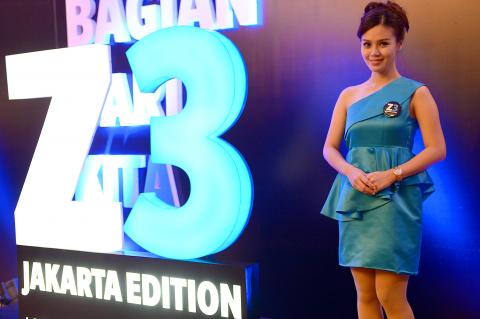BlackBerry Ltd launched a low-cost touch screen device in Jakarta, the Z3, as the embattled smartphone maker looks to revive sales in emerging markets like Indonesia, where its once-fervent following has shriveled.
The handset, unveiled at a glitzy launch event in the Indonesian capital on Tuesday, is the first in a line of devices being made with FIH Mobile Ltd (富智康), a unit of the giant Foxconn Technology Group (富士康科技集團) best known for assembling gadgets like iPhones and iPads for Apple Inc.
The success of the handset retailing for less than US$200 could well decide the outcome of both BlackBerry’s tie-up with the contract manufacturing giant and its own future in smartphones.

Photo: AFP
The Z3 Jakarta Edition will hit store shelves tomorrow. It is the first phone to be launched by BlackBerry since new chief executive John Chen (程守宗) took the helm late last year.
It is initially being launched in Indonesia, but will be gradually introduced in other markets as well.
Waterloo, Ontario-based BlackBerry hopes that the device and others to follow will help it claw back some of the collapse in its market share, ceded to Apple’s iPhone and Samsung Electronics Co’s line of Galaxy devices powered by Google Inc’s Android operating system.
“If the market doesn’t receive this product well, then we definitely have some negative issues to deal with,” Chen said at the launch at Jakarta’s Ritz-Carlton hotel.
Just two years ago, the Canadian firm had a 40 percent share of the Indonesian market, shipping more than 600,000 handsets per quarter in a country once known as “BlackBerry Nation.”
The launch of the premium, high-priced BlackBerry 10 last year failed to attract buyers in a country where nearly 40 percent of the population live on about US$2 a day. Indonesia is now dominated by Samsung, which sells about one of every three smartphones in Southeast Asia’s largest economy.
Chen hopes that the Z3 and other devices to follow spark a change in the company’s fortunes. The Z3 is being launched at a price point below US$200 to address one of the big turnoffs for consumers in emerging markets — BlackBerry 10 devices being too pricey.
“From conception to delivery, the BlackBerry Z3 Jakarta Edition was designed specifically with Indonesian customers in mind,” Chen said in a statement.
The device will allow users to type in Bahasa and come with a special set of BlackBerry Messenger, or BBM Stickers featuring local characters.
Later this year, BlackBerry will launch a new, non-touchscreen device dubbed the BlackBerry Classic in partnership with Foxconn. The handset will see a return of the command keys that include “Menu,” “Back,” “Send” and “End” buttons, along with a trackpad. BlackBerry hopes the move will address the concerns of those users who found their new devices hard to navigate.
For Foxconn, the tie-up fits with plans to set up a manufacturing plant in Indonesia to build smartphones and other electronic devices. The Taiwanese company’s ambitions have been on hold for years due to drawn-out talks over tax breaks, property and import restrictions.

Shiina Ito has had fewer Chinese customers at her Tokyo jewelry shop since Beijing issued a travel warning in the wake of a diplomatic spat, but she said she was not concerned. A souring of Tokyo-Beijing relations this month, following remarks by Japanese Prime Minister Sanae Takaichi about Taiwan, has fueled concerns about the impact on the ritzy boutiques, noodle joints and hotels where holidaymakers spend their cash. However, businesses in Tokyo largely shrugged off any anxiety. “Since there are fewer Chinese customers, it’s become a bit easier for Japanese shoppers to visit, so our sales haven’t really dropped,” Ito

The number of Taiwanese working in the US rose to a record high of 137,000 last year, driven largely by Taiwan Semiconductor Manufacturing Co’s (TSMC, 台積電) rapid overseas expansion, according to government data released yesterday. A total of 666,000 Taiwanese nationals were employed abroad last year, an increase of 45,000 from 2023 and the highest level since the COVID-19 pandemic, data from the Directorate-General of Budget, Accounting and Statistics (DGBAS) showed. Overseas employment had steadily increased between 2009 and 2019, peaking at 739,000, before plunging to 319,000 in 2021 amid US-China trade tensions, global supply chain shifts, reshoring by Taiwanese companies and

Taiwan Semiconductor Manufacturing Co (TSMC) Chairman C.C. Wei (魏哲家) and the company’s former chairman, Mark Liu (劉德音), both received the Robert N. Noyce Award -- the semiconductor industry’s highest honor -- in San Jose, California, on Thursday (local time). Speaking at the award event, Liu, who retired last year, expressed gratitude to his wife, his dissertation advisor at the University of California, Berkeley, his supervisors at AT&T Bell Laboratories -- where he worked on optical fiber communication systems before joining TSMC, TSMC partners, and industry colleagues. Liu said that working alongside TSMC

TECHNOLOGY DAY: The Taiwanese firm is also setting up a joint venture with Alphabet Inc on robots and plans to establish a firm in Japan to produce Model A EVs Manufacturing giant Hon Hai Precision Industry Co (鴻海精密) yesterday announced a collaboration with ChatGPT developer OpenAI to build next-generation artificial intelligence (AI) infrastructure and strengthen its local supply chain in the US to accelerate the deployment of advanced AI systems. Building such an infrastructure in the US is crucial for strengthening local supply chains and supporting the US in maintaining its leading position in the AI domain, Hon Hai said in a statement. Through the collaboration, OpenAI would share its insights into emerging hardware needs in the AI industry with Hon Hai to support the company’s design and development work, as well